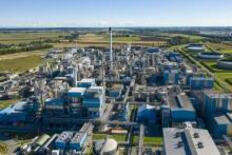- Hamburger Energiewerke will build the biomass cogeneration facility by the end of 2024.
- The plant will supply 70,000 MWh of steam and 90,000 MWh of electricity annually by 2025.
- Sasol will reduce CO2 emissions by 13,000 metric tons annually.
- The Brunsbüttel site produces organic and inorganic products for various applications.

Project Overview
Sasol Chemicals plans to double its use of green steam at its Brunsbüttel, Germany facility by leasing adjacent land to Hamburger Energiewerke. The municipal utility will build a biomass cogeneration plant by the end of 2024, which will be fully operational in 2025.
Energy and Emissions
The new plant will supply at least 70,000 megawatt hours of steam annually to Sasol, reducing CO2 emissions by approximately 13,000 metric tons each year. Additionally, it will produce over 90,000 megawatt hours of sustainable electricity annually.
Feedstock and Sustainability
The facility will be the first large-scale power generation plant to operate almost exclusively on well-pressed or dried fermentation residues. These residues will be sourced from plants certified under Germany’s Renewable Energy Sources Act, benefiting local agriculture by utilizing surplus material that would otherwise go to waste.
Existing Infrastructure
Since 2014, the Brunsbüttel facility has used green steam from another nearby biomass facility. Together, the two facilities will supply half of the plant’s steam consumption.
Production Capabilities
Sasol’s Brunsbüttel site, its largest in Germany, produces a wide range of organic and inorganic products. Organic products are used in detergents, cleaning agents, cosmetics, and pharmaceuticals, while inorganic products are key components in catalysts, high-performance abrasives, and polymer additives.

